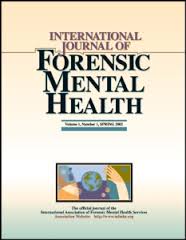This study examined whether self-reported traumatic brain injury (TBI) was associated with psychosis and/or the development of threat/control-override (TCO) symptoms in a sample of delinquent juveniles and early adults. The results reflect that there was an association between TBI and psychotic symptoms; however, TBI was not significantly associated with TCO. Nevertheless, paranoid ideation and psychoticism consistently predicted TCO in this sample. This is the bottom line of a recently published article in The International Journal of Forensic Mental Health. Below is a summary of the research and findings as well as a translation of this research into practice.
Featured Article | International Journal of Forensic Mental Health| 2020, Vol.19, No. 2, 152-164
Association Between Self-Reported Traumatic Brain Injury and Threat/Control-Override
Authors
Raquel V. Oliveira, College of Criminology and Criminal Justice, Florida State University
Kevin M. Beaver, College of Criminology and Criminal Justice, Florida State University; Center for Social and Humanities Research, King Abdulaziz University
Abstract
Prior research has focused on the effects of traumatic brain injury (TBI), psychosis, and threat/control-override (TCO) on violent behavior. There is, however, a lack of research exploring the potential connection between traumatic brain injury (TBI) and TCO. This study is designed to partially address this gap in the literature. To do so, a sample of delinquent youths followed to early adulthood is examined to estimate if self-reported TBI is associated with the development of TCO symptomatology. The results indicate that, although there is an association between TBI and psychoticism, TBI was not significantly associated with TCO, net of other variables in both longitudinal and cross sectional analyses. The results suggest, however, that paranoid ideation and psychoticism consistently predict TCO. Finally, the findings indicate that TCO does not consistently mediate the relationship between TBI and violent crime.
Keywords
Head injury; TBI; threat/control-override (TCO); psychosis
Summary of the Research
“TBI [traumatic brain injury] has been defined as an injury that affects the normal/regular functioning of the brain…TBI has been associated with different health outcomes including cognitive impairments, headaches, fatigue, sleep disturbances, neurological disorders…and several mental health issues…Beyond the different health outcomes, TBI may lead to behavioral changes, including self-centeredness, impulsivity, irritability, inappropriate behavior…and more aggressive and sometimes violent behavior…The severity of these outcomes will depend on a number of different factors, including the severity of the TBI, the location of the injury…age, number of TBIs…” (p.152).
“Studies have suggested that the existence of a TBI significantly increases the probability of involvement in violent and criminal behavior, with criminal populations having a higher incidence of TBI than non-criminal populations…More specifically, TBI has been associated with aggressive behavior and aggression against others in children…and to an increase in both violent and non-violent crimes in adolescent and adult samples when compared…[to] the general population who had no TBI…Moreover, the presence of TBI in incarcerated populations increased the risk of violent behavioral infractions for both male and female inmates…” (p.153).
“…Research examining the relationship between TBI and mental health has focused on multiple outcomes, including…psychosis…Given that not all individuals with psychosis engage in violent or criminal acts, it is important to further explore mechanisms that could mediate the association between TBI and violent outcomes…[Prior researchers] explored the possibility that TCO [threat/control-override] symptoms could explain this association…TCO was described by the authors as a set of psychological symptoms, associated with the individuals’ perception that they are being threatened or losing control. Specifically, TCO includes perceived threat/persecution (i.e., threat) and losing control/intrusion…These authors further observed that these perceptions of threat and/or control-override could be severe enough for the individual to override any constraints against violence…” (p.153-154).
“To the best of our knowledge, no studies have explored the potential association between TBI and the development of TCO symptoms, which might increase the risk of involvement in violent and criminal activities…we analyzed data f[rom] a large longitudinal sample of delinquent youths and young adults. The study sought 1) to explore the existence of a relationship between TBI and TCO symptoms, and 2) to investigate if the relationship between TBI and violent crime…could be partially explained by the presence of TCO…The sample for this study was drawn from the Pathways to Desistance Study (PDS) (Mulvey, 2012). The PDS is a longitudinal study with a sample of serious juvenile offenders adjudicated from juvenile and adult courts in Ph[o]enix and Philadelphia…” (p.154-155).
“First, in the longitudinal analysis we observed that TBI is a significant predictor of psychoticism in this sample…it was [thus] possible to further explore if there was an association between TBI and TCO, being that TCO is commonly present in psychosis and psychotic states. Derived from this analysis, the second key finding to emerge from this study was that the association between TBI and TCO was only statistically significant when few controls were included in the cross-sectional analyses. In more rigorous models, however, the influence of TBI on TCO was no longer statistically significant after accounting for the effects of important control variables…In this way it seems that TBI does not consistently predict the presence of TCO symptoms” (p.160).
“…although TBI did not predict TCO, both paranoid ideation and psychoticism were consistently associated with TCO…This association between psychoticism and paranoid ideation is consistent with the literature…TCO is a set of psychological symptoms that only arises in individuals with psychosis or psychotic-like states…Thus, it would be expected that both psychoticism (a measure of symptoms ranging from social alienation to psychotic symptoms) and paranoid ideation (which closely parallels the control override symptom) would be significantly and consistently related to TCO…we tested for the possibility that TCO could partially mediate the relationship between TBI and violence…we can conclude that TCO does not consistently mediate the relationship between TBI and violent offending frequency…” (p.160).
Translating Research into Practice
“…the results from this study revealed that TBI and psychoticism were associated, providing further support for this association, which is still largely debated in the literature…The relationship between TBI and psychoticism might effectively help explain why certain individuals with psychotic-like symptoms are more likely to engage in criminal behaviors than others and should be further explored in future studies….Future research should focus on exploring additional potential mechanisms that might mediate or moderate the relationship between TBI and violence” (p.161).
Other Interesting Tidbits for Researchers and Clinicians
“…studies have shown that one of the potential consequences of TBI is the onset of a psychosis with schizophrenia-like symptoms…The rates of psychosis following TBI appear to be approximately two to three times larger than those in the general population…Finally, the onset of psychotic symptoms following the TBI may occur at any time between the first year after the injury and 10 years post-injury…” (p.153).
Join the Discussion
As always, please join the discussion below if you have thoughts or comments to add!























